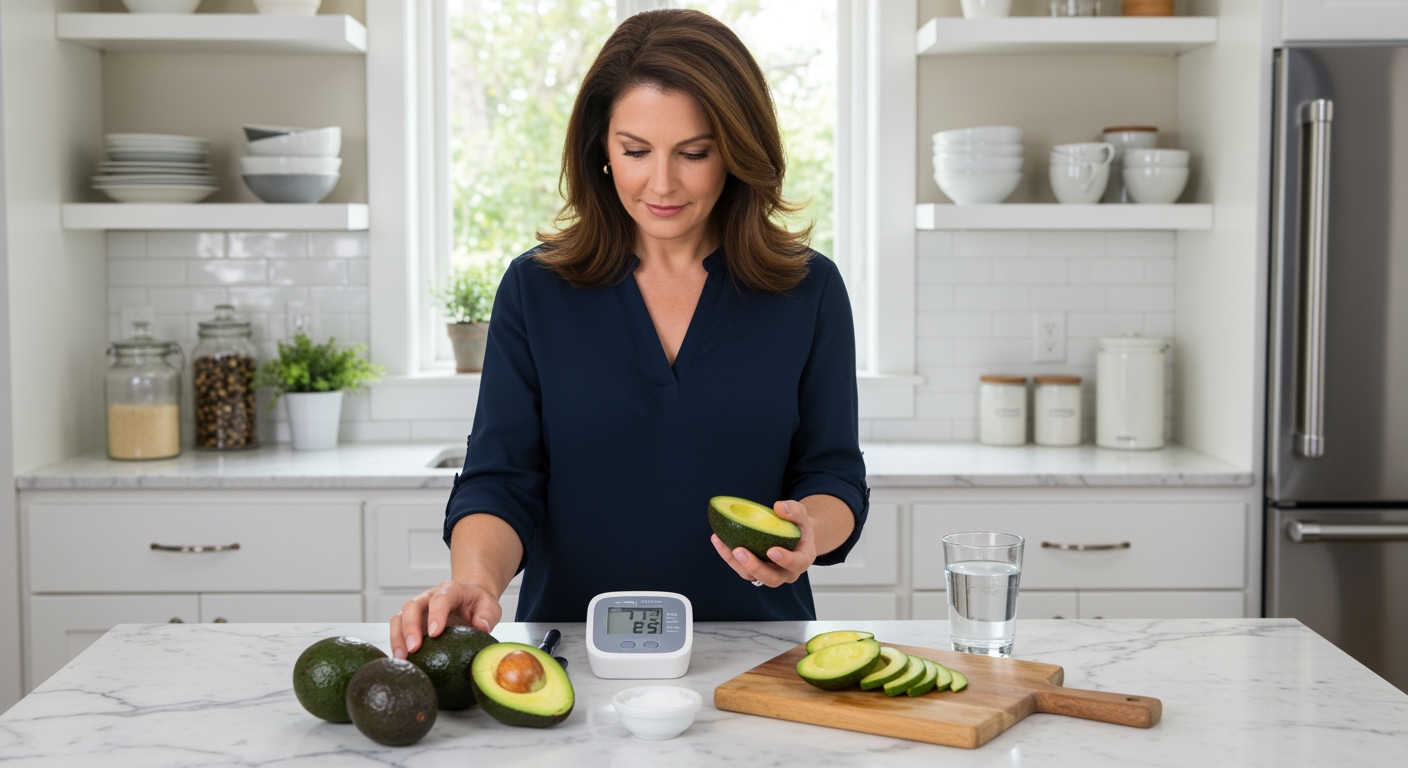✪ Key Takeaway: Avocados may not be ideal for low blood pressure as they contain compounds that can further lower already low readings.
Introduction
You reach for that creamy avocado thinking it will boost your health, but what if it actually makes your low blood pressure worse?
Many people with hypotension wonder whether this popular superfood will help or harm their condition. The confusion comes from conflicting information about avocados and cardiovascular health that floods the internet daily.
Hi, I’m Abdur, your nutrition coach and today I’m going to explain exactly how avocados affect low blood pressure and whether you should include them in your diet.
How Do Avocados Actually Affect Blood Pressure?
Avocados contain several bioactive compounds that directly influence your cardiovascular system. The most significant is potassium, with one medium avocado providing about 975 milligrams of this essential mineral.
Potassium works by relaxing blood vessel walls and helping your kidneys remove excess sodium from your body. This mechanism typically leads to lower blood pressure readings in most people.
The fruit also contains monounsaturated fats that improve blood vessel function and reduce inflammation. These healthy fats help your arteries stay flexible and responsive to blood flow changes.
Research shows that regular avocado consumption can decrease systolic pressure by 3-4 mmHg in people with normal or high blood pressure. However, this same effect becomes problematic when your baseline pressure is already low.
The magnesium content in avocados adds another layer of blood pressure reduction. This mineral helps regulate your heart rhythm and supports smooth muscle relaxation in blood vessels.
✪ Fact: One avocado contains more potassium than three bananas combined.
What Happens When You Have Low Blood Pressure?
Hypotension occurs when your blood pressure drops below 90/60 mmHg consistently. This condition means your heart struggles to pump enough blood to meet your body’s oxygen and nutrient demands.
Common symptoms include dizziness, fatigue, and fainting because your brain receives insufficient blood flow. These episodes often happen when you stand up quickly or after eating large meals.
Your body tries to compensate by increasing heart rate and constricting certain blood vessels. However, these mechanisms sometimes fail to maintain adequate circulation to vital organs.
People with low blood pressure need foods that support blood volume expansion and gentle pressure elevation. This typically means increasing sodium intake moderately and choosing foods that enhance circulation.
The goal is achieving a stable pressure range that prevents symptoms while avoiding dangerous spikes. This delicate balance requires careful attention to dietary choices and their cardiovascular effects.
✪ Note: Low blood pressure can be just as dangerous as high blood pressure in certain situations.
Should You Avoid Avocados With Hypotension?
Complete avoidance is not necessary, but portion control becomes crucial when you have low blood pressure. The key lies in understanding how much and when to consume this nutrient-dense fruit.
Start with small portions like one-quarter of an avocado per day and monitor your blood pressure response. Keep a log of your readings before and after eating avocado-containing meals.
Timing matters significantly with hypotension management. Eating avocados with sodium-rich foods can help counterbalance their pressure-lowering effects naturally.
Consider pairing avocado with foods that support blood pressure stability like eggs, cheese, or whole grain toast with a pinch of sea salt. This combination provides balanced nutrition without dramatic pressure drops.
Your individual response varies based on medication use, hydration status, and overall health. Some people with mild hypotension tolerate avocados well, while others experience noticeable symptoms.
Work with your healthcare provider to determine the right approach for your specific situation and blood pressure goals.
✪ Pro Tip: Monitor your blood pressure for two hours after eating avocado to understand your personal response.
What Are Better Food Choices For Low Blood Pressure?
Focus on foods that naturally support blood volume and circulation without causing dramatic pressure swings. These choices help maintain steady energy levels while preventing hypotensive episodes.
Salty snacks in moderation can help raise blood pressure temporarily. Think olives, pickles, or lightly salted nuts rather than processed junk foods loaded with artificial additives.
Lean proteins like chicken, fish, and eggs provide steady energy without the blood pressure-lowering effects of high-potassium fruits. These foods support muscle function and circulation.
Complex carbohydrates from whole grains and root vegetables help maintain stable blood sugar levels. This stability prevents the energy crashes that worsen hypotension symptoms.
Stay adequately hydrated with water and consider adding a pinch of sea salt to your beverages. Proper hydration supports blood volume and helps prevent pressure drops.
Small, frequent meals work better than large portions for people with low blood pressure. This eating pattern prevents postprandial hypotension that occurs after big meals.
✪ Pro Tip: Eat smaller meals every three hours to maintain steady blood pressure throughout the day.
The Bottom Line
Avocados can lower blood pressure further in people who already have hypotension, potentially worsening symptoms like dizziness and fatigue. While this creamy fruit offers many health benefits, portion control and careful monitoring become essential for those with low blood pressure.
Your body’s response to food is as unique as your fingerprint, and understanding these individual differences is the key to optimal health. The goal is finding the right balance that supports your cardiovascular health without causing unwanted symptoms.
I would love to hear about your experiences with avocados and blood pressure management. Have you noticed any changes in your symptoms after eating this popular fruit? Please share your thoughts and questions in the comments below.
References
At NutritionCrown, we use quality and credible sources to ensure our content is accurate and trustworthy. Below are the sources referenced in creating this article:





